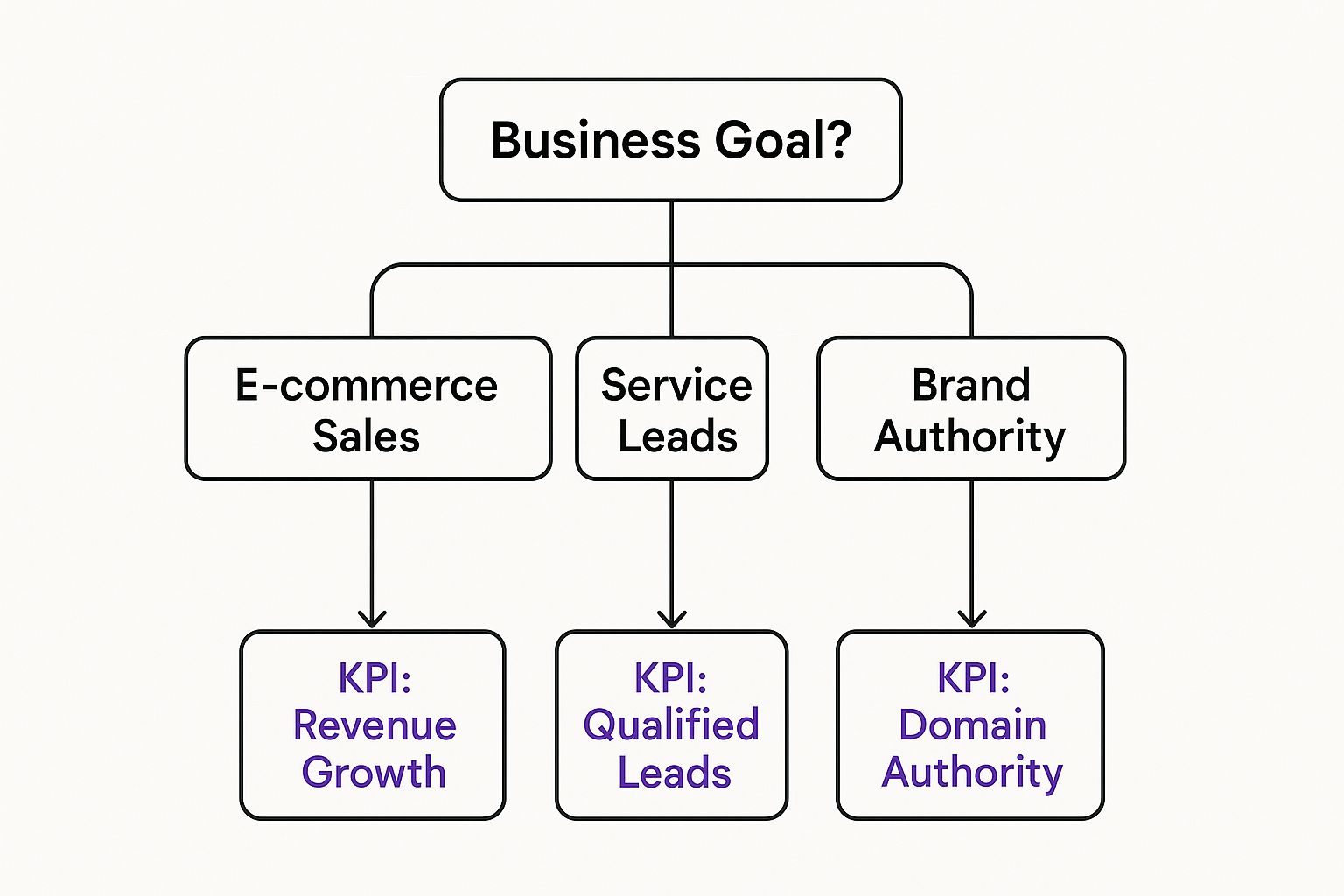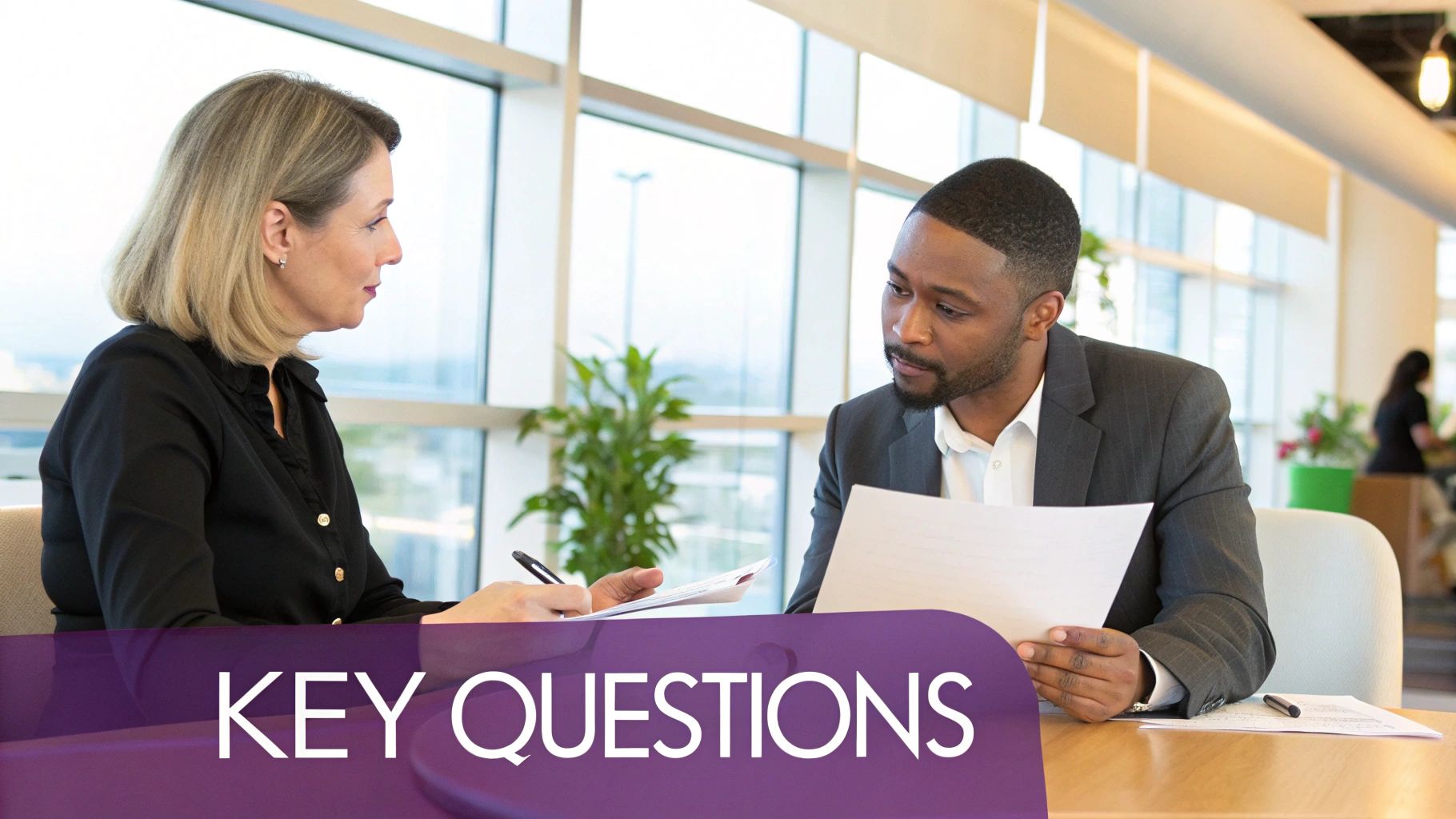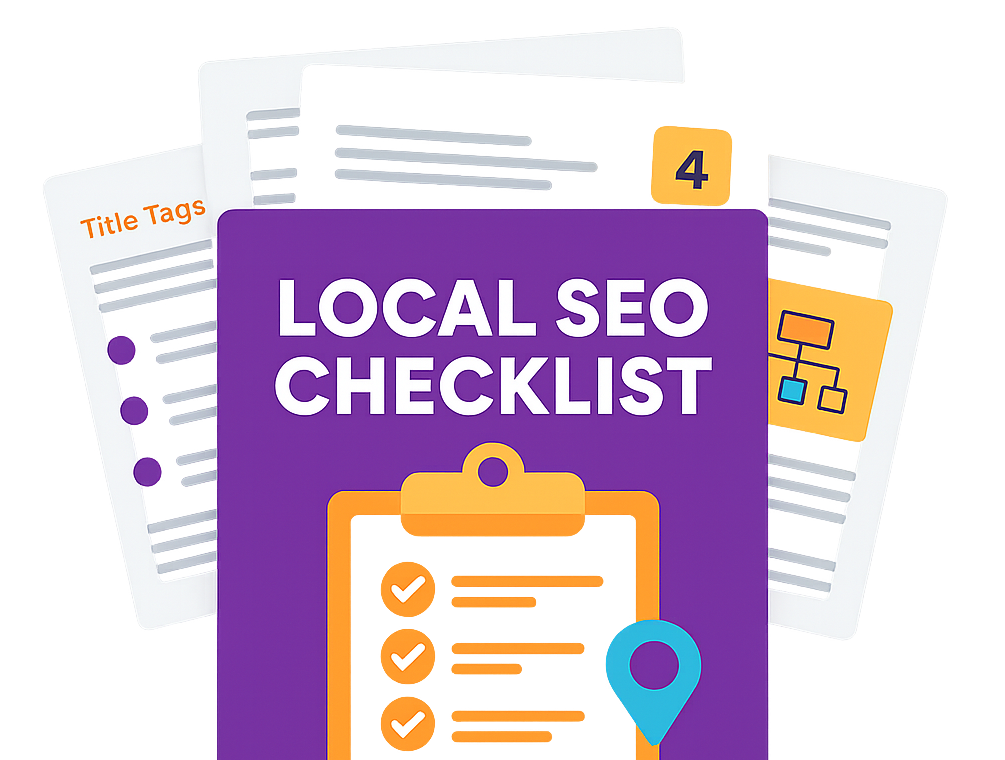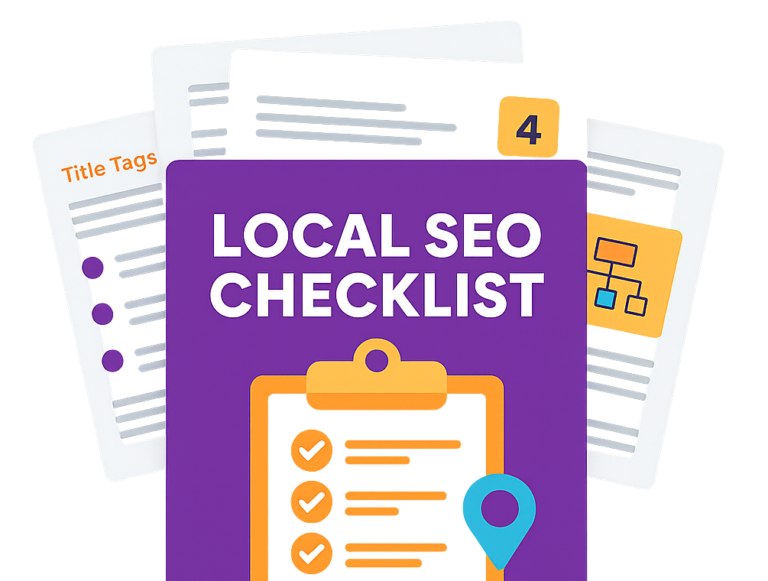Before you even think about searching for an SEO agency, the first move is an internal one: you need to get crystal clear on what success actually looks like for your business. Forget vague goals like "more traffic." We need to pin down specific, measurable outcomes that directly impact your bottom line. Getting this right from the start is the bedrock of a great agency partnership.
Defining Your Business Goals Before Starting Your Search
Think of it this way: you can't hire an agency effectively until you can give them a clear brief. Without specific targets, how can you possibly measure their performance or know if you're getting a return on your investment? It’s like setting off on a road trip with no destination in mind—sure, you're moving, but you have no idea if you're getting anywhere useful.
Your business objectives will shape every part of the strategy an agency proposes. For instance, an e-commerce brand might be chasing a 20% increase in online sales in six months. A local plumber in Cambridgeshire, on the other hand, couldn't care less about nationwide traffic; they just want more qualified phone calls from their specific service area.
Match Goals to Tangible Outcomes
Let's make this practical. You need to connect your big-picture ambitions to concrete Key Performance Indicators (KPIs). This simple exercise turns fuzzy hopes into solid metrics that any decent agency can understand and build a strategy around.
- E-commerce Sales: Your main KPI isn't traffic, it's revenue. A good agency will focus on optimising product pages and chasing keywords that scream "I'm ready to buy!"
- Service Leads: Here, it’s all about quality over quantity. Success is measured by the number of qualified enquiries, demo requests, or consultation bookings you get.
- Brand Authority: If your goal is to become the go-to expert in your field, your KPIs might be an improved Domain Authority, ranking for informational "how-to" keywords, and seeing more people search for your brand by name.
This decision tree breaks down how your main business goal should directly influence the KPI you obsess over.

As you can see, the road to a winning SEO campaign always starts with identifying your core commercial objective.
Create Your Internal Brief
Once you've defined these goals, pull together a simple internal brief. This document should also sketch out your target audience and list your main competitors. Knowing who you're up against is vital, and you can get a head start by learning how to conduct competitor analysis in our in-depth guide.
Key Takeaway: A well-defined set of goals and KPIs is your most powerful tool in the selection process. It ensures every conversation with a potential agency is focused, productive, and centred on delivering measurable business results.
Evaluating an Agency's Expertise and Track Record

Alright, you’ve got your business goals nailed down. Now for the hard part: vetting potential SEO partners. This is where you need to look past the slick sales pitches and dig for genuine expertise. A great agency won’t just talk about vanity metrics; they’ll have a solid track record of delivering results that actually matter to your bottom line.
The demand for good SEO in the UK is massive. The market hit a staggering £19.2 billion in 2023 and has been growing at 11.2% annually for the last five years. That’s because it works—around 42% of UK consumers turn to search engines to find products, which is more than double those using social media. This is precisely why picking the right agency is a make-or-break decision. You can see more data on the UK SEO market at artios.io.
Beyond Surface-Level Case Studies
Every agency has case studies. Your job is to rip them apart. Don't get distracted by big-name logos or flashy presentations. You need to find proof that directly lines up with the goals you've just set for your own business.
If you’re running an e-commerce site, a case study showing a huge traffic spike for a local plumber is pretty much useless to you. You need to see evidence that they’ve driven revenue, boosted conversion rates, and increased average order values for businesses in your space.
Expert Tip: Ask for case studies from clients in a similar industry or facing similar challenges. Look at where they started, what strategies were used, and which specific KPIs improved. Hard numbers are everything.
To help you stay organised during your evaluation, here’s a quick checklist you can use to compare agencies at a glance.
SEO Agency Evaluation Checklist
This table is a handy reference to make sure you're asking the right questions and looking for the right signals as you talk to potential partners.
| Evaluation Area | What to Look For | Red Flags to Spot |
|---|---|---|
| Case Studies | Results relevant to your industry and goals (e.g., revenue, leads). | Vague results, vanity metrics, no access to client references. |
| Technical SEO | Deep knowledge of site speed, crawlability, and indexing. | Glossing over technical details or using excessive jargon. |
| Strategy | A clear, customised plan based on data and research. | One-size-fits-all approach or "secret sauce" claims. |
| Communication | Regular, transparent reporting that links actions to goals. | Evasive answers, infrequent updates, or complex reports. |
| Link Building | Focus on earning high-quality, relevant backlinks ethically. | Promises of hundreds of links quickly, mentions of PBNs. |
Using a structured approach like this helps you cut through the noise and focus on what truly indicates a capable and trustworthy SEO partner.
Assessing Their Technical and Strategic Skills
Real SEO expertise is built on a deep understanding of the technical stuff. A good agency has to know the ins and outs of how search engines crawl, index, and rank websites. They should be able to break down complex topics without breaking a sweat.
This is your chance to separate the real experts from the pretenders. Their team must be skilled in:
- Technical SEO Audits: Pinpointing and fixing the gremlins holding your site back, like slow page speed, crawl errors, or indexing problems.
- Strategic Keyword Research: Going beyond the obvious to find high-intent keywords your ideal customers are actually typing into Google.
- Content Strategy: Creating a roadmap for content that doesn't just rank but answers questions and nudges users towards a sale.
- Ethical Link Building: Earning high-quality backlinks from authoritative sites to build your domain's credibility with search engines.
Getting to grips with these concepts is crucial. For a deeper dive, our guide on what is technical SEO is a great starting point.
Transparency and Communication Are Non-Negotiable
Finally, pay close attention to how an agency communicates. It’s a huge clue as to what working with them will actually be like. You're looking for total transparency in their process and reporting. They should be happy to explain their methods in plain English, not hide behind industry jargon.
A great partner will feel like an extension of your own team. They’ll provide regular, easy-to-digest reports that tie their work directly back to your business goals. If they seem secretive or dodge your questions, that’s a massive red flag. Walk away.
Asking the Right Questions in Your Initial Meetings

This is it. The initial meetings are where you cut through the noise and separate the genuine partners from the slick salespeople. It’s your chance to look under the bonnet and see how an agency really works.
Forget the generic "tell me about your process" questions. The quality of your questions will directly dictate the quality of the answers you get back.
Your goal here is to really understand their strategic thinking, get a feel for their team, and see how they handle the inevitable bumps in the road. These chats should feel less like a pitch and more like a proper strategy session. It's how you'll suss out their working style and true depth of expertise.
Unpacking Their Strategy and Philosophy
Every agency has its own flavour. Some are technical purists, obsessed with site speed and schema. Others are content-led storytellers. You need to find the one whose approach actually fits with what you’re trying to achieve.
Start by digging into how they’d tackle your specific business challenges. This is where you find out if they've done their homework or are just recycling the same old pitch deck.
- "Based on what you know about our business, what do you see as our biggest opportunity and our most significant threat in organic search?" This one forces them to apply their knowledge directly to your situation.
- "How do you balance resources between technical SEO, on-page optimisation, and off-page link building?" Their answer will tell you a lot about their strategic priorities and whether they see the whole picture.
- "Google's algorithms are always changing. Can you walk me through how you adapted a client's strategy after a recent major update?" This tests their agility and shows you how they solve problems in the real world.
A good answer will be nuanced and specific, not a one-size-fits-all formula.
Questions About Team Structure and Communication
The people you’ll be working with day-to-day are just as important as the agency's grand strategy. You absolutely need to know who is doing the work and how you'll communicate with them.
Key Insight: The person selling you the service is rarely the person who will be managing your account. It's crucial to understand the experience level of the team you'll be assigned and how accessible they will be.
Get straight to the point with questions about their operational setup.
- Who will be my main point of contact, and what is their level of SEO experience? You want a dedicated, experienced account manager, not to be passed around a support desk.
- How often will we have scheduled meetings, and what does a typical monthly report look like? This sets clear expectations for communication from day one. A great report doesn't just show data; it links their activities directly to your business goals.
- What is your average client retention rate? A high retention rate, ideally over 90%, is a massive green flag. It speaks volumes about client satisfaction and their ability to deliver consistent results.
Probing on Performance and Problem-Solving
Finally, you need to know how they act when things don't go to plan. Because they won't, always. SEO isn't a straight line to the top; there will be challenges. How an agency handles this reality says everything about its character and commitment.
Ask them to be frank about past difficulties. Try something like, "Tell me about a time a campaign didn't deliver the expected results. What did you learn, and how did you pivot the strategy for the client?"
Their answer will reveal their accountability and transparency. A confident, honest response is a great sign. Blaming the algorithm is not.
Assessing Their Strategic and Integrated Approach
Let's be blunt: effective SEO never happens in a vacuum. It needs to be woven into the very fabric of your marketing, not just bolted on as an afterthought. This is where you separate the tactical agencies from the truly strategic partners. Are they just selling a one-size-fits-all package, or are they genuinely trying to build a customised strategy around your business goals?
A forward-thinking agency gets that organic search is just one piece of a much larger puzzle. They should be actively looking for ways to make your SEO work harder by connecting it with your other channels. It’s this synergy that creates a powerful, unified presence and drives sustainable growth.
Beyond SEO Silos
The best agencies think like holistic marketers, not just SEO technicians. They see the bigger picture—how organic and paid search can feed each other, how social media can amplify brilliant content, and how email marketing can re-engage the traffic you’ve worked so hard to earn.
During your conversations, they should be asking smart questions about your wider marketing activities to spot those integration opportunities. For instance:
- PPC & SEO: How can we use the data from your paid campaigns—like high-converting ad copy and keywords—to sharpen our organic content strategy?
- Content & Social Media: How do we create content that doesn’t just rank on Google, but is also compelling enough to get shared across social channels, massively broadening its reach?
- Email Marketing: How can our SEO efforts drive new subscribers to your email list, and how can we use that list to promote new content and give it an initial ranking boost?
This integrated mindset is a huge green flag. It shows an agency is focused on your overall business growth, not just vanity metrics like keyword rankings. It proves they appreciate the entire customer journey.
Expert Takeaway: An agency that only talks about SEO is missing the point. You’re looking for a partner who can clearly explain how organic search will complement and enhance your paid media, social, and content marketing for a much greater collective impact.
A Growth-Oriented Partnership
The UK digital agency sector is booming, with revenues projected to hit £20.4 billion in 2025. While SEO is still the largest and fastest-growing slice of that pie, the top agencies are diversifying into complementary services to offer a more cohesive client experience. You can discover more insights about the digital agency market on capsulecrm.com.
Ultimately, you’re hiring a growth partner, not just a service provider. Their strategy needs to show they’ve done their homework on your competitive landscape and business objectives.
For example, a key part of their plan might involve robust link-building activities. It’s well worth getting familiar with the different approaches involved by reading our guide on effective off-page SEO strategies. Having that background knowledge will make it much easier to assess their proposed tactics and ask the right questions.
Choosing an agency with this kind of strategic, integrated approach ensures your investment delivers a powerful return. You'll be building a cohesive force that drives your entire business forward in the competitive UK digital space.
Spotting Red Flags and Unrealistic SEO Promises

In the world of SEO, if a promise sounds too good to be true, it almost certainly is. Learning how to choose the right SEO agency is really about becoming an expert at spotting the warning signs that signal a bad partnership is on the horizon. This is where you protect your business from dodgy tactics and unethical providers.
Distinguishing between a confident forecast and an empty guarantee is critical. A reputable agency will be optimistic but ground their projections in data and experience. A questionable one will offer grand promises with zero substance, preying on your desire for a quick win.
Guarantees of Number One Rankings
This is the oldest and most obvious red flag in the book. No agency, no matter how skilled, can guarantee a number one ranking on Google for a competitive keyword. It's just not possible. Search algorithms are incredibly complex, constantly changing, and influenced by hundreds of factors—many of which are completely outside an agency's control.
A good agency will talk about improving your overall visibility, targeting realistic keywords, and steadily increasing organic traffic over time. They focus on the process and sustainable growth, not on an impossible outcome.
Key Takeaway: Any guarantee of a specific ranking is an immediate deal-breaker. It shows they either don't understand how SEO works or, worse, they're deliberately trying to mislead you.
Secretive or 'Proprietary' Methods
Transparency is everything. If an agency claims they use a "secret sauce" or a "proprietary technique" that they can't explain, you should be very sceptical. Real SEO is built on established best practices: technical expertise, quality content, and ethical link building. It's not some mysterious, black-box method.
You have a right to know exactly what is being done in your name. A trustworthy partner will be completely open about their strategies, from the initial technical audit to their outreach process for building backlinks.
An Obsession with Quantity over Quality
Another massive warning sign is a fixation on volume, especially when it comes to links. An agency that boasts about getting you "500 links per month" is likely using low-quality, automated, or even black-hat techniques that can get your website penalised by Google.
- What you want to hear: "We focus on earning high-authority, relevant backlinks from reputable websites in your industry."
- What to be wary of: "We will build hundreds of links to your site quickly to boost your rankings."
The quality and relevance of a single backlink from a trusted source are worth more than a thousand spammy links from irrelevant directories. SEO is a vital channel for UK businesses, and engaging in risky tactics can jeopardise a significant revenue stream.
Statistically, 77% of UK businesses invest in SEO, and for retailers, local searches account for a huge 46% of all Google queries. Protecting this asset is paramount.
To get better at spotting these red flags, it helps to understand what's real and what's not in today's SEO. Brushing up on common myths by reading about Is SEO Dead? Myths and Best Practices Explained will make you far less likely to fall for unrealistic claims.
Making Your Final Choice and Starting the Partnership
You've done the legwork. You’ve researched, sat through meetings, and narrowed down your list of potential agencies. Now for the most important part: making that final decision with total confidence. This last step isn’t just about evaluation anymore; it’s about starting a partnership with an agency that’s not only skilled but also the right cultural fit for your team.
Honestly, the decision shouldn't hang on just one thing. It's about taking a balanced view, weighing their strategic proposal against the day-to-day reality of working together. A great cultural fit is just as crucial as a brilliant technical audit. A team that gets your vision and communicates well will always be a better long-term partner.
Scrutinising the Final Proposal and Contract
Before you even think about signing, you need to go through the contract and statement of work with a fine-tooth comb. This document is the rulebook for your entire relationship, so clarity is everything. Vague terms or hidden clauses are red flags that can lead to serious headaches down the line.
Look for a clear, itemised breakdown of deliverables, timelines, and reporting schedules. It absolutely must specify:
- Key Performance Indicators (KPIs): The exact metrics used to measure success. These should tie directly back to the business goals you defined at the very beginning.
- Scope of Work: A detailed list of what’s included in the retainer. Think technical fixes, content creation, link-building outreach—get it all in writing.
- Reporting Cadence: How often will you get performance updates? Our monthly SEO report template shows you what a comprehensive report should really look like.
- Contract Length and Termination Clause: Most good agencies offer flexible rolling contracts, but you must be crystal clear on the notice period required to end the partnership if things don't work out.
Expert Tip: Pay very close attention to who owns the work. You should always retain full ownership of all content and any optimisations made to your website, even if you part ways with the agency.
Kicking Off a Successful Partnership
Once you've made your decision, a smooth onboarding process is what sets the stage for a great working relationship. Those first few weeks are all about getting aligned on strategy and finding a productive rhythm. A well-organised agency will guide you through this, starting with a proper kick-off meeting to introduce the teams and lock in your goals.
From there, you should expect them to dive into an in-depth technical audit while also running strategy sessions to finalise the initial campaign focus. This kind of collaborative start ensures everyone is on the same page from day one, building a strong foundation for achieving incredible results together.
Your Questions Answered
When you're trying to figure out how to choose an SEO agency, a few questions always seem to pop up. Let's tackle them head-on with some straight answers to help clear things up.
How Much Should a Small UK Business Expect to Pay for SEO?
This is the big one, isn't it? The truth is, SEO costs in the UK can be all over the place. You might find a local freelancer for a few hundred pounds a month, while a big national campaign from a full-service agency could run into the thousands.
For a small business, a typical monthly retainer usually lands somewhere between £750 and £2,500. What you actually pay depends on what you need, how tough your industry is, and the agency's track record. My advice? Stop focusing on the raw cost and start thinking about the potential value and return on investment. Always, always ask for a detailed breakdown of what your money gets you.
How Long Does It Take to See Results from an SEO Agency?
Patience is a virtue in SEO. Meaningful results are never instant. You might spot some small improvements in the first one to three months, but the real, significant gains in organic traffic and rankings typically take 6 to 12 months to properly materialise.
Think of it this way: SEO is a long-term game. It's about building authority, creating genuinely good content, and earning Google's trust over time. If an agency promises you the world overnight, that's a massive red flag.
What Is the Difference Between a Freelance SEO and an Agency?
A freelance SEO consultant is a one-person show. They’re often a deep specialist in a particular niche, like technical audits or content strategy, which can make them a great, cost-effective choice for very specific tasks.
In contrast, an SEO agency brings a whole team to the table. You get specialists covering every angle of search engine optimisation—technical, content, link building, and strategy. An agency usually has broader resources and can offer a more complete, integrated approach to your growth.
If you have other questions about their services or SEO in general, you might find their frequently asked questions page useful.
At Bare Digital, we provide transparent, results-driven SEO services designed for UK businesses. Ready to see how we can help you grow? Get your free, no-obligation SEO Health Check and a tailored proposal today. Learn more at https://www.bare-digital.com.








